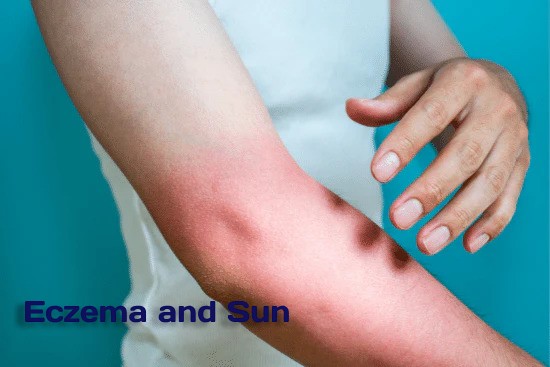
Introduction
Have you ever wondered if your sunburn could be doing more harm than just giving you a painful red glow? For those with sensitive skin, like individuals prone to eczema, the connection between sunburn and eczema might be more intertwined than you think. Let’s explore how these two skin conditions interact and what you can do to protect your skin.
What Is Eczema?
Eczema, also known as atopic dermatitis, is a chronic skin condition that causes redness, itching, and inflammation. It’s often linked to a combination of genetic and environmental factors. Triggers like allergens, harsh weather, or certain skincare products can set off flare-ups.
Types of Eczema and Their Triggers
Eczema comes in different forms, such as contact dermatitis, dyshidrotic eczema, and seborrheic dermatitis. Each type has specific triggers, ranging from allergens and stress to changes in temperature.
Understanding Sunburn
Sunburn happens when your skin gets overexposed to ultraviolet (UV) rays, leading to inflammation and damage. It’s not just about the pain and redness; severe sunburn can compromise your skin’s barrier, making it more vulnerable to external irritants.
Effects of Sunburn on the Skin
When your skin is sunburned, it becomes dehydrated, inflamed, and less capable of protecting itself. This sets the stage for conditions like eczema to worsen or flare up.
The Link Between Sunburn and Eczema
Can Sunburn Trigger Eczema Flare-Ups?
Yes, sunburn can act as a trigger for eczema. The damage caused by UV rays compromises the skin barrier, allowing irritants and allergens to penetrate more easily, which may lead to inflammation and itching.
How Sunburn Exacerbates Skin Sensitivity
Sunburned skin is already inflamed, and for eczema sufferers, this means double trouble. The heat, redness, and peeling from sunburn can make eczema symptoms even more pronounced.
Signs and Symptoms to Watch For
Symptoms of Sunburn-Induced Eczema
Look out for symptoms like intense itching, redness, and patches of dry, flaky skin on areas that were sunburned. These signs might indicate eczema triggered by sun exposure.
Differences Between Sunburn and Eczema Symptoms
While sunburn causes redness and peeling, eczema often involves dry, cracked, or thickened skin. Eczema may also cause small, fluid-filled blisters, which are less common in sunburn.
Who Is Most at Risk?
Vulnerable Groups
People with fair skin, a history of eczema, or those who work outdoors are at higher risk of experiencing sunburn and its effects on eczema.
Environmental and Lifestyle Factors
Hot, humid climates and prolonged exposure to UV rays can increase the likelihood of flare-ups.
Prevention Tips
How to Avoid Sunburn
Apply a broad-spectrum sunscreen with SPF 30 or higher, wear protective clothing, and stay out of the sun during peak hours. Reapplying sunscreen every two hours is essential, especially if you’re swimming or sweating.
Skin Care Tips for Eczema-Prone Individuals
Choose sunscreens labeled as hypoallergenic and free of irritants. Avoid alcohol-based products, as they can dry out your skin.
Treatment Options
Remedies for Sunburn
Cool compresses, aloe vera gel, and over-the-counter anti-inflammatory creams can help soothe sunburned skin.
Managing Eczema Flare-Ups
Use gentle cleansers and moisturizers to restore your skin’s barrier. Consider using a fragrance-free cream to minimize irritation.
The Importance of Moisturizing
Benefits of Hydration for Sunburn and Eczema
Moisturizing helps repair your skin’s barrier, reducing inflammation and preventing further damage. Look for products with ceramides and hyaluronic acid for maximum hydration.
Choosing the Right Moisturizer
Opt for products that are fragrance-free, dermatologist-approved, and specifically designed for sensitive skin.
When to See a Doctor
Signs Your Sunburn or Eczema Needs Medical Attention
If you experience severe blistering, fever, or signs of infection, it’s time to seek medical help. Persistent eczema that doesn’t respond to over-the-counter treatments may also require professional care.
Tips for Communicating Symptoms to a Dermatologist
Be specific about your symptoms, including when they started and what makes them better or worse. Photos of affected areas can also be helpful.
Conclusion
Protecting your skin from the sun is more than just a matter of aesthetics; it’s a crucial step in managing eczema and avoiding painful flare-ups. By understanding the connection between sunburn and eczema, you can take proactive steps to keep your skin healthy and irritation-free.
FAQs
Can sunburn permanently damage skin?
Yes, repeated sunburns can cause long-term skin damage, including premature aging and an increased risk of skin cancer.
Is it safe to use sunscreen on eczema-prone skin?
Absolutely! Just ensure you use a hypoallergenic, fragrance-free sunscreen to avoid irritation.
What ingredients should I avoid in skincare for eczema?
Avoid products with alcohol, fragrances, and harsh chemicals. Stick to gentle, dermatologically tested options.
How long does it take for sunburn-induced eczema to heal?
It varies, but most cases improve within 1-2 weeks with proper care and treatment.
Can tanning help reduce eczema symptoms?
No, tanning can worsen eczema by damaging your skin’s protective barrier and increasing inflammation.





Leave a Reply